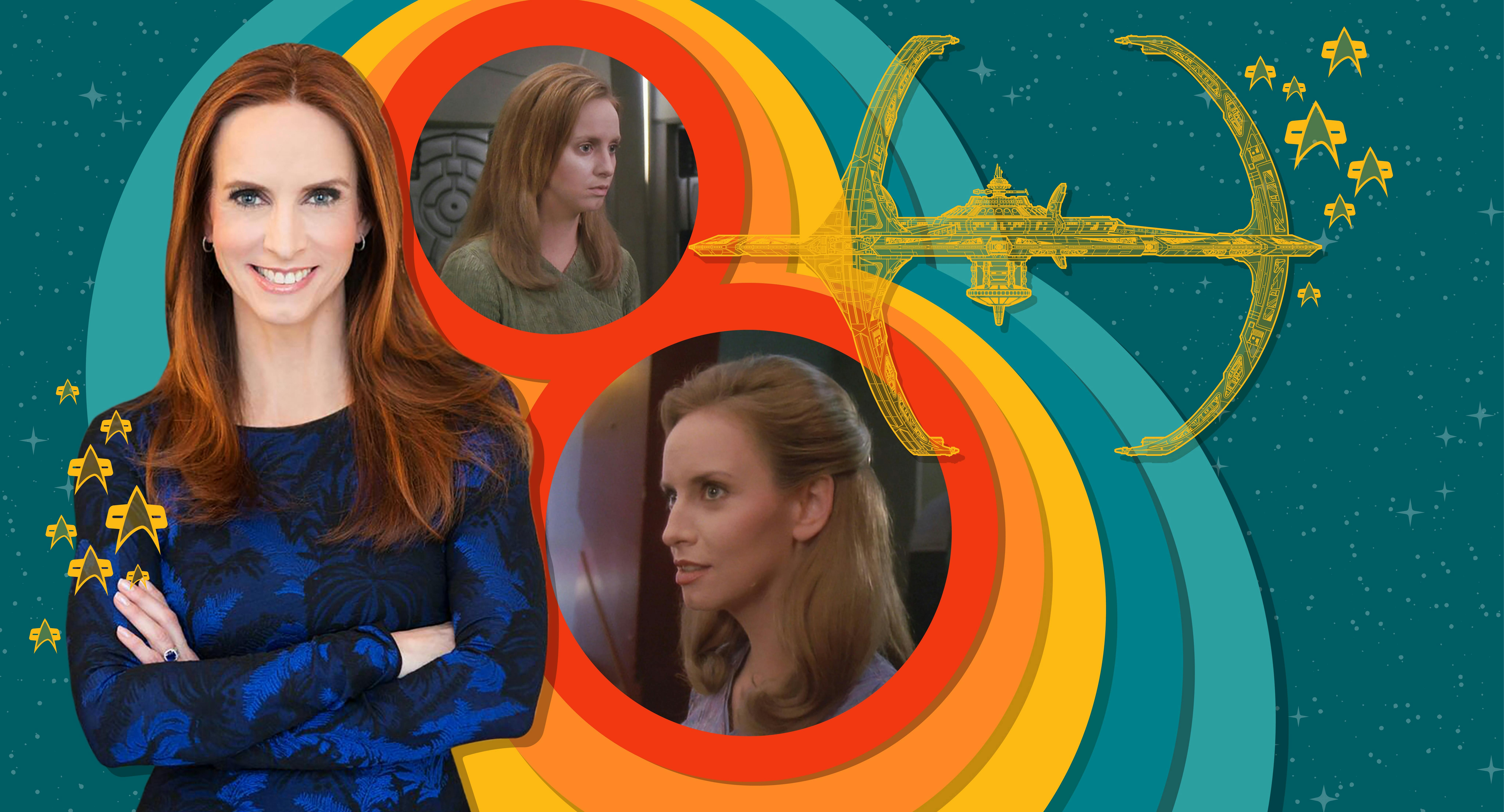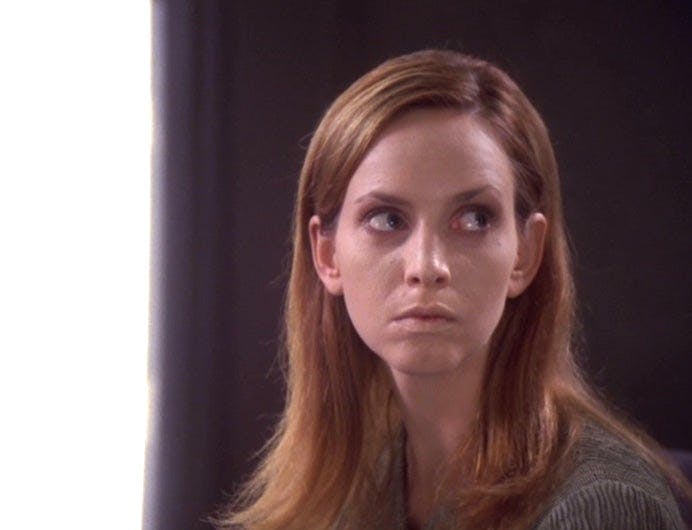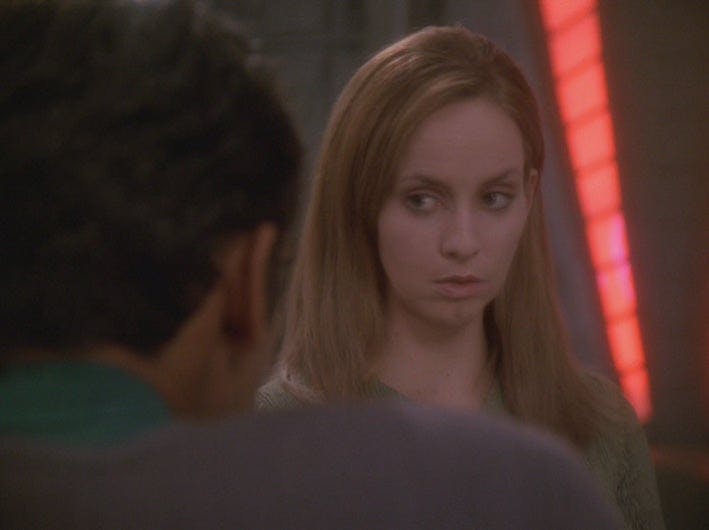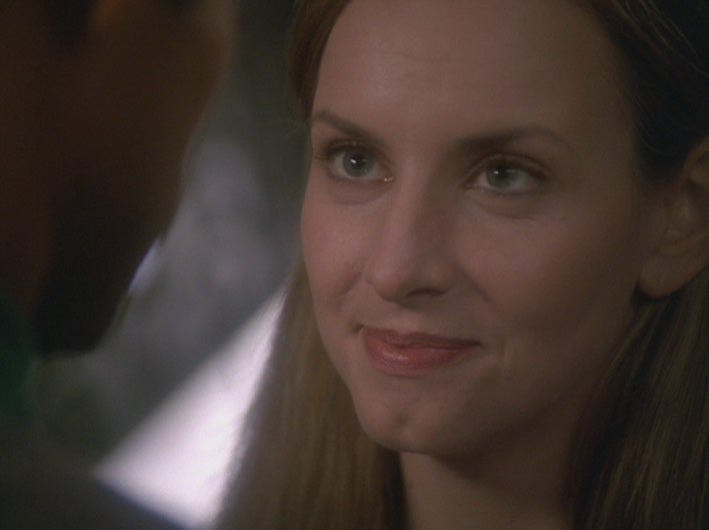Published Oct 28, 2021
Faith Salie Shares Her Deep Space Nine Memories
The actress and journalist reflects on her time in the Jack Pack

StarTrek.com | Sharon Schuster
The trading card lies somewhere in the apartment. The memories are easier to resurrect. Though her stint on Deep Space Nine was brief, as Sarina Douglas, the youngest member of the genetically engineered “Jack Pack,” Faith Salie flexed her singing abilities, was wooed by Dr. Bashir, and got beamed up—an iconic pop culture moment few can claim.
“I’ll drop that anytime,” says Salie, a Harvard graduate and Rhodes Scholar.
There’s a good reason she embraces her time on DS9. “The Jack Pack” — the quartet of institutionalized geniuses beamed up for observation played by Salie, Tim Ransom, Michael Keenan, and Hilary Shepard — made memorable appearances in two episodes: “Statistical Probabilities,” where Jack and the gang’s enthusiasm for data analysis leads to a near catastrophe, and “Chrysalis,” where Dr. Bashir brings the sheltered Sarina to life and nearly finds a soul mate.

StarTrek.com
Salie has thrived in a different career since departing the U.S.S. Defiant. She is best known as a journalist/storyteller, thanks to CBS Sunday Morning. She’s also a fixture on the NPR mainstay Wait, Wait…Don’t Tell Me. This fall, Salie will star in an off-Broadway one-woman show, Approval Junkie, based on her terrific 2016 collection of personal essays. Despite her fondness for DS9, Salie, now 50, hadn’t seen the episodes in nearly 25 years, but she did for this interview. Salie received a potent reminder of a bittersweet period in her life personally and professionally—and what she has to look forward to now .
Faith Salie: I had not watched these episodes — one of them in 24 years and one of them in 23 years, because there's a pain attached to it.
StarTrek.com: What pain is there?
FS: And pride. I love that I got to play this amazing character and be part of this iconic series.
I was cast in “Statistical Probabilities” in the summer of ‘97 and my mother was dying. So when I was back in LA to film it, I was thrilled. It was the biggest part I had gotten since I had moved to LA after grad school. But it was a chunk of time I was away from her while she was dying. She was so happy because Deep Space Nine was a very well-received television show. It was the first time I learned what single card meant. My agent was very proud to tell me that he got me single card credit, so it’s only my name on screen. And because my mom was dying and I hoped she would see this episode, I put my middle initial [C]—as my credit. My middle initial is her maiden name. And it aired a month after she died. I was so sad that she never got to see it.
She did die happy. Her two older sons were married or as good as married, like my brother and his partner at the time. I didn't have anybody. I had just moved to LA. I know it made her very happy to think that, “Oh, my daughter's career has launched with this role.” That’s part of it. And then with “Chrysalis,” my wasband [Salie’s term for her ex-husband] saw that episode and said that he was watching it at home recovering from coming out of chemo, and I thought I was so beautiful. He thought, I'm going to marry that girl.
I have to tell you another amazing connection is that Tim Ransom, he and I fell in love in 2006. So I moved to New York, I'm separated from my wasband and Tim's there. We fell in love and lived together for half a year. He was the magic relationship that shifted me into knowing that I could be lovable again after such a horrible separation. Isn’t that crazy?
That’s a real swirl of emotions associated with these episodes.
FS: This is like therapy. It makes me realize, OK, I'm not crazy for not having watched these in a long time. When you line it up that way, these are a lot to watch. And if you want to add to that list, reckoning with getting older and looking older and missing desperately — I mean, desperately missing — acting and singing. So much so that when I watch it… I love that song and I loved singing it. It was so gratifying.

StarTrek.com
Why do you think The Jack Pack has endured?
FS: They're so human and fallible and id-ish, right? To have really funny, fallible people be so smart, it's so refreshing and lovable. What was so interesting about [my] role was that there was no subtext. When you're an actor, you're always looking for what's underneath. That's what they need to play. It's not the lines, but the feelings underneath the lines and Sarina was so cool to play because there was zero subtext. I love the scene at the table at the bar and she says to Miles and Bashir, “Why are you two pretending that you're not best friends?” She's so childlike. It’s challenging to have a scene that is romantic and not be flirting. The scenes ended up being romantic, but I'm supposed to be bewildered and guileless. It was really fun to have that challenge. I loved it.
What was it like working with the pack? You got along famously with Tim.
FS: Now that I know him better, I think he was anxious about the role. Hilary was kind. She had just had a baby. I remember the nanny bringing her her baby. I was the kid. Tim and Hilary were in their thirties. Michael was in his fifties. Michael and I got along great. When I moved into a new apartment, he had furniture he let me use for years. Anson [Williams, the director of “Statistical Probabilities”] was just like a kid, just such positive energy. He was the first person I ever knew who drank wheatgrass. He was always like, “Oh everybody, you've got to drink wheatgrass,” and I was like, well, maybe I do, because Potsie has got some youth. This man is joyful and positive and looks great. There was a lot of laughing. It was just so fun.
It was just sort of fun to make fun of how weird I was. I was in on the joke, too. They'd say cut, I'd be like, “Can I stop walking around the room with a vacant look on my face?” It was a very strange role to play. I had this pivotal scene where I untied Bashir, and that's where my lines were. I had been waiting the whole time to fill in that scene. I filmed it. It was intense. I just remember feeling so much anxiety about that scene because it was finally my time to shine. I felt good about it after we filmed it. And then it comes [out on] November 24, 1997. It was Thanksgiving night. My mom has been dead for a month. My brothers and my father and their spouses and I are all in Florida at my dad's house. It gets to that scene and I'm just like, “This is where my lines are and then they cut them! Whaaattt!” Of course, if you had told me that night, “Look, in a year you're going to have a whole episode about you and an aria” I would have been a little less disappointed, but I was kind of flabbergasted. [Laughs]
I have to ask about the do-re-mi scene. How did that work?
FS: We all sang. Hilary had a band. She was quite the rock and roll singer. Michael's just old school, could do anything. Tim can sing, but doesn't feel confident about it. So he was really annoyed. He was not having it. He was so annoyed that he had to do it and he was the weakest link. And, of course, I'm in my glory. I was having the best time. I had made this horrible decision not to go to New York to do musical theater. I made this terrible, life-altering decision to move to LA to do film and TV. So I was like, oh my gosh, this is my chance to sing and do TV. And they actually doubled up my voice. So they had my voice on top of my voice to make it a stronger and richer sound. And they dubbed Tim — that that was not his voice.

StarTrek.com
You said you miss acting, even though it hasn't gotten you the success compared to what you do now.
FS: Most people who know me are surprised that I sang and danced or was on Star Trek. I was a professional kid actor. I acted my way through college and grad school. There was a long time where I felt like I was still pretending to be what people call a journalist and a host. Now, I feel like that's legitimately me. It’s in my bag of tricks. When I got to do my one-woman show two years ago, it felt like returning to myself. I felt whole. That sounds very grand, but I felt whole. There has been nothing more satisfying professionally than that, even though I love what I do. I love helping people tell stories. I love telling stories for The Moth, but the fact that I get to return to acting even for one month at the end of this year — I’m so excited.
I've gotten to 50. If I'm lucky, I'm in the middle of my life. I have so much happening professionally and personally that you really get to a point you're like, what is worth my time and what fills my soul. And I know that I need to put acting back into the recipe of what makes up me.
This interview has been edited and condensed.
Pete Croatto (he/him) is a writer based just outside of Ithaca, NY, whose work has appeared in the A.V. Club, RollingStone.com, The New York Times, RogerEbert.com, and many other outlets. He is also the author of From Hang Time to Prime Time: Business, Entertainment, and the Birth of the Modern-day NBA (Atria Books). Follow him on Twitter, @PeteCroatto.
